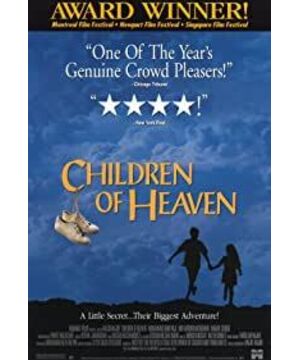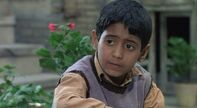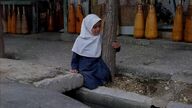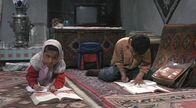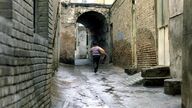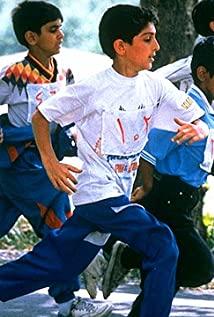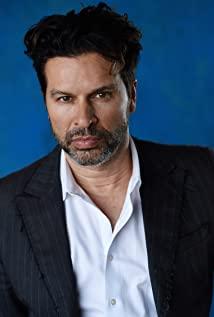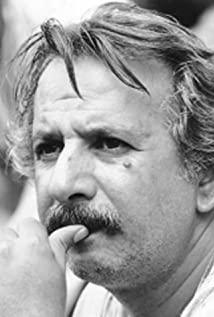Among them, "Little Shoes" directed by Majid Majidi and released in 1997 can be described as one of the most shining pearls. Its significance is not only to knock the Oscar door for the Middle East film industry with a strong Islamic culture. It also shows to the world the full picture of life in the mysterious country of Iran. Although it takes two children as the protagonists, it can arouse deep reflection and resonance among people of all ages.
When watching the film, the first thing you see is the simplicity and nature of its image style. This can be said to be a unique feature of Iranian films, which enables the film to show the whole story in complete details, thus more perfectly highlighting the central idea. , "Little Shoes" is to show the meaning of life and highlight the value of human nature through the passage of an ordinary event in the life of ordinary people. It is not difficult to find that the biggest factor in its success lies in the perfect description of the details, which makes such an ordinary event embodies such an extraordinary meaning.
The whole film revolves around a pair of "little shoes", radiating multiple details, showing the life of the poor people at the bottom of the developing countries in a full picture. The repaired pink girl's shoes, and then the close-up scene was switched. A little boy appeared. A little boy was repairing a pair of women's shoes. What would happen? The film is intended to let the audience enter the story with questions. Then, the little boy alone bought a flying cake with an area larger than his body, and then went to buy potatoes and was treated coldly by the shopkeeper. When he returned home, the voice-over between his mother and others quarreled, and then he believed Most viewers can get the information that the film tells what happened to the poor people at the bottom of society, and can roughly guess that the series of events that followed were triggered by this pair of little shoes.
The subsequent plot unfolded one by one in the context it should have developed. Like a rivalry between two brothers and sisters, his brother Ali went back to the vegetable and fruit shop to find shoes, and was scolded by his father when he returned. Seeing this, we should fully feel that the social feature of "poor children heading home early" is vividly displayed here. We may not experience the kind of bitterness in the relatively superior growth environment, but we will recall how we all have Facing the helplessness of growth. So, this is a film that can resonate with people of all ages and levels of life. And when we saw Little Ali begging her sister to conceal her parents because of losing her shoes, and when she returned home after looking for the shoes, we learned of the sadness and helplessness of her mother’s illness, which made us feel sympathy and think of us growing up. Some of the hardships encountered in this article are really nothing here. The so-called "suffering" is more thorough and typical for the poor.
Little Ali’s house, a small single room, the cry of the baby, the parents arguing for their livelihoods so that the siblings could not have their own space, they could only lie down on the ground and write on the homework to discuss how to deal with the pair of lost shoes. An event that has been considered a major event for the family...The film has so far shown the environment of the characters' lives in various details. In the last shot of this scene, the brother Ali gave his sister Sarah his pencil, and the younger sister has already sharpened it. The pencil that couldn't be shorter makes people feel sad, but this simple picture conveys warmth and touch. At this time, the details begin to fully serve the character's character...
Because of poverty, the brothers and sisters are naturally yearning for a better life. In front of the shop window with all kinds of beautiful shoes, the sister Sara’s envy was beyond words; although poor, the two brothers and sisters did not lose the kindness and human beauty of the simple working people. They found that the shoes were already worn. When on the feet of another girl in the same school, the two brothers and sisters gave up the pursuit of this pair of shoes that belonged to them, only because they saw that her life was just as miserable. Seeing this, I think of the impetuous metropolis of my own life, full of interpersonal indifference and estrangement, and often because of a little loss, I care about no one and don’t let others happen from time to time. How many people will help others. And sacrifice one's own due interests? I believe that the optimism of the brothers and sisters in their lives is the most contagious aspect of this film. It perfectly shows that poverty is not terrible. As long as the bottom-line beauty of human nature is maintained, life is also full of happy human values.
Fly on the viaduct with fast-moving vehicles, the father and son on bicycles seem to be so incompatible with the fast-paced traffic, door-to-door knocking on the door to be rejected, all of which seems to us to be the hardships and hardships of life. Sad drama, but who can say that the father and son in the story are not happy? Yes, it’s very happy to get something through my own labor. The story is here. I believe everyone is looking forward to the little boy’s wish to buy a pair of new shoes for his sister as soon as possible. When new hopes come, our "heroes" will often face even greater tests. The plot takes a sharp turn once again. A sharp downhill makes his father fall and injured, so the hope of "making big money" is shattered. How should our "hero" Ali face so that my sister can put on new shoes like the other little girl in the story?
In the last paragraph of the story, "race" is undoubtedly the most prominent part of the use of imaging technology in the entire film. The multi-camera shooting, which is rare in the entire film, is adopted to show the "hero" Ali fighting for his dream from all angles. Go all out with no distractions. Try to keep yourself in the third position and you can't exert any effort. The only thing that echoes in your ears is the conversation with your sister before and after this incident. So, after being pulled down by the laggard, all he can do is move forward at full speed and sprint. The camera was slowed down, and we couldn't help but hold our breath and shout for "heroes". This simple set of shots brought the audience’s emotions to the highest point. At the moment when the first crossed the finish line in the last, we don’t know whether it was happy or sad for him. He won the championship but lost the third place he wanted to get. A pair of new shoes, is this an explanation of the philosophy that "the best is not necessarily suitable for you, but the best for you" in life? Thought-provoking.
Finally, it is worth mentioning that the performances of the two little actors in the film. At the end, there are no lines and only expressions in this scene. There is disappointment, but I believe that at this time, it is more understanding, but it is extremely heavy. Incomparably warm, the companionship of the goldfish at the end of the foot, the material and I blend, and it has a profound meaning. At this time, we seem to understand the meaning of life to us more. Poverty is really nothing. Don’t lose the desire for beautiful things. Be positive and optimistic. Living, maintaining the truth and goodness of human nature, can harvest growth and realize the value of life.
View more about Children of Heaven reviews


